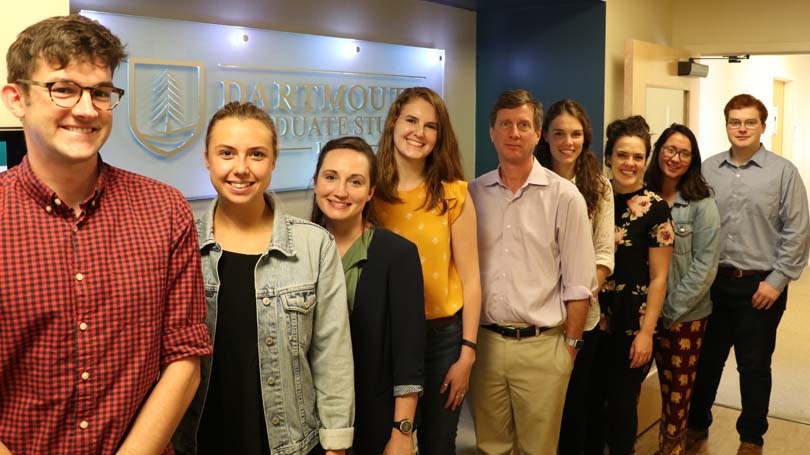
The GSC Executive Committee members meet monthly with Dean Kull
A “Circle of Safety” was the topic of the monthly lunch with the Graduate Student Council (GSC) executive board and Dean of the Guarini School, Dr. Jon Kull. Circle of Safety refers to a concept created by Simon Sineck, which is the topic of his 2014 Ted Talk found here. The concept describes the theory that if employers provide a space where employees feel safe from outside problems and stressors and feel they belong, then the employees have better mental health and the company is more productive. GSC executive members Eva Childers, student life chair, and Curtis Petersen, academic chair, were inspired by this idea and have taken initiative to provide a Circle of Safety for graduate students at Dartmouth.
The need for an environment where graduate students feel confident, comfortable, and valued has been made quite clear in a recent Nature publication “Some hard numbers on science’s leadership problems”. Perhaps the most intriguing data from this publication are the number of principle investigators (PIs) that do not have the same concerns or goals as non-PIs in labs, which includes graduate students and research staff. PIs believe the most important factors to fix in their labs are administrative support and support for management, whereas non-PIs believe the most important factors to fix are a culture of respect for work-life balance and a reduced focus on high-profile papers as a measure of productivity (Van Noorden).
Looking at the mental health status of graduate students makes the need for intervention even more clear. While only 6% of the general population suffers from moderate to severe anxiety or moderate to severe depression, graduate students experience these illnesses at a rate of 41% and 39%, respectively. In a 2015 study from the University of Arizona, the school found that the doctoral students whom experienced these illnesses stated that the most significant contributor to their stress and depression was education-related issues (Evans et al.).
Childer’s and Petersen’s response was to implement a multi-pronged approach to provide graduate students with proper mental health care while simultaneously bettering the environment in which they work, tying in with the Circle of Safety. The first plan of attack is to address the role other students play in recognizing mental health issues in fellow students and encouraging those students to seek help. Many campuses across the country have implemented a student-based system called a “Student Support Network”. In this platform, students are trained by mental health care professionals to recognize signs of depression, anxiety, and abuse, and they are provided with resources available on campus that they can pass along to students in need. This allows students to serve as a first line of defense for fellow graduate students who may be struggling as peer conversations are generally more honest and open. Dartmouth has just implemented its own Student Support Network and if you are interested in joining the team please contact Bryant Ford, the Associate Director of Counseling at Dick’s House.
The second prong of action is to address the role that PIs play in lives of graduate students. PIs are often the only in-person contact graduate students have daily, particularly in the sciences. It is essential that PIs, in addition to graduate students, are trained on recognizing and providing resources for mental health issues that may arise and on providing a non-hostile and supportive work environment. Childers and Petersen plan to work with the Guarini School to provide optional and, hopefully in the future, mandatory training sessions for PIs that focus on management and the promotion of mental health and productivity. Again, many schools across the nation are already implementing programs like this specifically for faculty because this is not just a Dartmouth problem. Asking this training of professors is not unreasonable or unheard-of and in the recent Nature publication most PIs said they wanted management training (Van Noorden). It is also important to note that any faculty with concerns about the training recognize that productivity significantly increases when employees are mentally stable and feel supported.
Another facet of healthy graduate students involves proper education on Title IX. For example, it is a commonly held belief among students that Title IX reports are automatically sent to the police or campus authorities for investigation with or without the permission of the victim. This is not the case. Kristi Clemens, Title IX coordinator for Dartmouth, receives the reports, emails the victim with resources and plans of action, if desired, and awaits a response from the victim. If the victim never reaches out, the report goes no further than her desk. It is essential that students feel comfortable reporting incidents that occur in the academic environment as it helps protect others if there are serial offenders on campus. If you would like to report a Title IX violation or incident, simply email Kristi Clemens directly, or you can submit an anonymous report for sexual or other ethical violations at the link here. Dartmouth uses a third party to keep all the reporter’s information private from the college.
GSC president, Katharine von Herrmann, will be presenting the studies mentioned in this article along with the plans of action developed by Childers and Petersen to the Council on Graduate Studies in the coming weeks. Our hope is to highlight the need for change, provide resources to those in need, and encourage a change in PI culture. If you have any questions about the data or plans mentioned in this article, please email the GSC. If you’d like to be involved in any of these initiatives, please reach out to Eva Childers or Curtis Petersen.